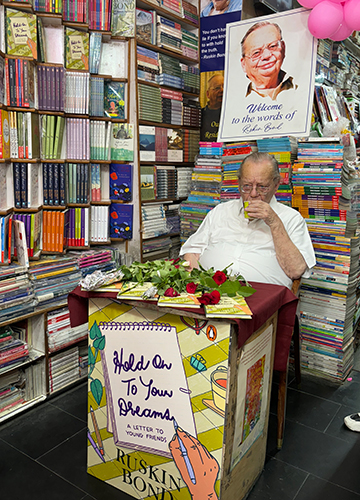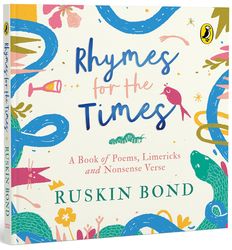While the Covid pandemic was a time of frustration for the young, who wanted to go on with their lives, it was a time of waiting for the old, writes Ruskin Bond in his latest book of nonsense poetry, Rhymes for the Times. Would they survive or would they get the virus too? To make matters worse, Bond got a skin infection which kept him awake at night. The itching would start as soon as he went to bed. And so, to get through the night, he started writing limericks and nonsense verse.
“I have written serious verse in the past, but as I get older, life seems to get a bit funnier,” the master crafter, who turned 90 last May, told THE WEEK. “So I thought some nonsense would put me in a better mood. A lot of it was real nonsense and went into the waste paper basket. But some nonsense made sense, and Penguin kindly put it together in this book.”
The poems are by turns absurd, silly, wise, funny, and profound. The best truths, after all, are conveyed through humour. For example, here’s how Bond shows that beneath the surface, we are all the same:
Great men must burp,
And saints must sneeze,
And kings grow wobbly in the knees,
And so, when people laugh at you,
Remember―they’re just as funny in the loo.
Most of the poems are drawn from memory and experience. A poem on a man who laughed too much was inspired by a folk tale that was narrated to him many years ago by a woman who lived in a village near Agra. “She used to tell me funny stories about village life,” says Bond. “She is long gone, but I remembered her story about a man who laughed so much that his head fell off.”
Another series of poems on a strange café that serves expensive caterpillar soup and jelly taken from the stomach of alligators was inspired by his experience of visiting a café that served chicken that looked like crow. “It was a very strange café indeed, and we weren’t sure what we were having,” he says with a laugh.
There are poems on God, pets, cricket songs, shepherd’s pie, Irish stew, travel, nature, and falling in love. When I refer to the last, he smiles. “That keeps happening,” he says. “There used to be a song called ‘Falling in Love Again’. I sing very badly, so I dare not try singing it for you.”
I ask him about the first time he fell in love. “It was with a girl who was already engaged to be married,” he says. “She was a village girl. I approached the family and they told me that they would cancel the engagement if I could pay them enough money. But I didn’t have the money. So she married her fiancé. Then there was this other woman who did not marry me, but who has remained a good friend over the years. She’s a grandmother now.”
Reading Bond fills you with a sense of peace and transports you to a magical land of multi-hued sunrises, mist-capped mountains, and tinkling streams; of custard pudding and strawberry milk shakes (slurping which is something he loves); of acts of kindness and neighbourly love. This sense of contentment did not come easy for him though. There were periods of struggle, depression, and loneliness.
“I discovered loneliness when, at the age of six, my mother put me in a residential convent school, kissed me goodbye and went away,” he writes in his book, The Golden Years: The Many Joys of Living a Good Long Life. “I felt completely abandoned. There was I, surrounded by over a hundred rough and noisy brats, most of them bigger than me, and no one to turn to, apart from several unsympathetic Irish nuns. (I wasn’t Catholic, which made it worse.) I avoided the playing field, stayed silent in class, and sat or rather knelt through chapel services in fear and trepidation. The walls were covered with pictures of Jesus being tortured and crucified, and the priest, who said or sang everything in Latin, also swung a small brazier from which burnt frankincense (supposedly) gave out a nauseating odour.”
Those times, he found refuge in reading, writing, and going on long walks. “We had a good library in school,” he tells me. “Whenever I wanted to escape morning PT or homework, I would sneak off to the library and lock myself in. They made me the librarian for three years so I had the key. I read everything―from the plays of George Bernard Shaw to the stories of Bulldog Drummond (a fictional character created by H.C. McNeile).”
Even today, he loves shutting the windows, closing all the doors, and curling up on the sofa with a pile of books. “In minutes I am in a tropical paradise; or in a jungle teeming with beautiful birds; or I’m on a camel in the desert; or I’m picking strawberries in the English countryside….,” he writes in The Golden Years. “I can consult Sherlock Holmes or Hercule Poirot. I can join Mr Pickwick on the ice, or those three men in their boat. I can join Lord Emsworth in admiration of his prized pig, or have lunch with Bertie Wooster at the Drones Club…. Waves of humanity come and go. May they find their nirvana. Mine is right here on my bookshelves.”
His favourite time of day, however, is when he wakes up in the morning. He keeps the curtains drawn so that he can watch the dawn break. From his bed, he can see the sun come up over the mountains. He finally gets up when his daughter-in-law brings him a cup of tea. Soon after, he starts writing, “a page or two of sense or nonsense, whatever comes to mind”.
I ask him whether he has any parting words about finding the nonsense in life, love, or in his latest book. “It’s not the sort of book that is in fashion,” he says. “Because nowadays kids seem to be reading a lot of horror and adults, crime. This is different. I hope it will make a nice Christmas or New Year present.” And then he adds with characteristic self-deprecating humour: “It is nice for small kids, too, if they want to fight with each other. It’s quite strong, so they can bang each other on the head with it.”
RHYMES FOR THE TIMES: A BOOK OF POEMS, LIMERICKS AND NONSENSE VERSE
By Ruskin Bond
Published by Puffin Books
Price: Rs350





